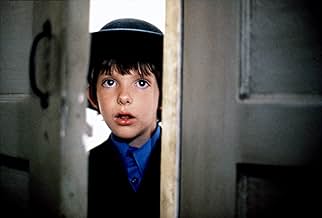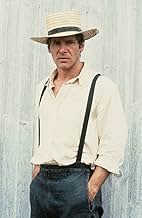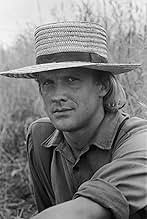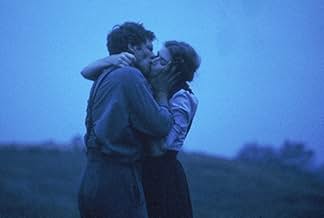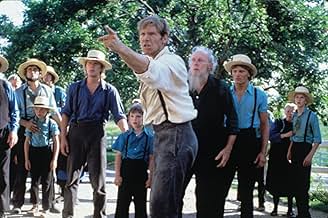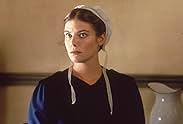Witness
- 1985
- Tous publics
- 1h 52m
While protecting an Amish boy - who is the sole witness to a brutal murder - and his mother, a detective is forced to seek refuge within their community when his own life is threatened.While protecting an Amish boy - who is the sole witness to a brutal murder - and his mother, a detective is forced to seek refuge within their community when his own life is threatened.While protecting an Amish boy - who is the sole witness to a brutal murder - and his mother, a detective is forced to seek refuge within their community when his own life is threatened.
- Won 2 Oscars
- 13 wins & 28 nominations total
Summary
Reviewers say 'Witness' is acclaimed for its crime thriller elements and cultural exploration, highlighting Harrison Ford's nuanced performance. The Amish community portrayal, though sometimes romanticized, adds depth. The romantic subplot is noted for its subtlety. Peter Weir's direction and cinematography are praised, yet some criticize plot inconsistencies and pacing. The soundtrack, though fitting, occasionally clashes with the film's tone.
Featured reviews
This is one of those movies whose virtues and subtleties become more and more apparent with subsequent viewings. The crime story is nothing more than a pretense - a "MacGuffin", in Hitchcock's phrase - on which to hang this sensitive and insightful story of the conflict between modernity and the culture of the Amish, which is portrayed here with admiring respect and not a hint of condescension.
Harrison Ford's portrayal of John Book is perhaps his finest work on screen so far. In particular, Book's struggle to suppress his rising attraction for Rachel, and his tormented realization that a relationship between them is not possible, is achingly portrayed. Ford's effort is well-matched by Kelly McGillis, whose beauty here is almost breathtaking. The erotic interplay between them, because it is unconsummated, radiates an almost painful tension, and the easily lampooned "running through the field" scene - because it has been led up to so convincingly - is almost heartbreaking. The character of Eli Lapp, wonderfully played by Jan Rubes, is richly multifaceted. His suspicion of the "English" outsider and his anger at Rachel's attraction to him, is surmounted by an underlying humanity. His parting words to Book, "You be careful out there among them English," are moving testimony to his acceptance of him. His stern yet loving dialogue to his grandson about renouncing hatred and violence is a treasured moment.
Both direction and cinematography are splendid. The simplicity of Amish interiors is shot in a way that makes its austerity almost beautiful, and the barnraising scene is an exercise in cinematic lyricism.
It would be easy to fault the movie for the facile scene in which the punks taunting of Book's newfound friends and protectors drives him over the edge (Eli: "It's not our way, Book" / Book: "No, but it's MY way."), but his gift to the young thug of a bloody nose is mighty satisfying to behold.
My one criticism is with the music; certainly not with the venerable Maurice Jarre's score itself, but with its paltry synthesized realization. They should have found the money to spring for a full orchestra.
In short, a highly satisfying, richly themed, and multifaceted film which is well worth watching.
Harrison Ford's portrayal of John Book is perhaps his finest work on screen so far. In particular, Book's struggle to suppress his rising attraction for Rachel, and his tormented realization that a relationship between them is not possible, is achingly portrayed. Ford's effort is well-matched by Kelly McGillis, whose beauty here is almost breathtaking. The erotic interplay between them, because it is unconsummated, radiates an almost painful tension, and the easily lampooned "running through the field" scene - because it has been led up to so convincingly - is almost heartbreaking. The character of Eli Lapp, wonderfully played by Jan Rubes, is richly multifaceted. His suspicion of the "English" outsider and his anger at Rachel's attraction to him, is surmounted by an underlying humanity. His parting words to Book, "You be careful out there among them English," are moving testimony to his acceptance of him. His stern yet loving dialogue to his grandson about renouncing hatred and violence is a treasured moment.
Both direction and cinematography are splendid. The simplicity of Amish interiors is shot in a way that makes its austerity almost beautiful, and the barnraising scene is an exercise in cinematic lyricism.
It would be easy to fault the movie for the facile scene in which the punks taunting of Book's newfound friends and protectors drives him over the edge (Eli: "It's not our way, Book" / Book: "No, but it's MY way."), but his gift to the young thug of a bloody nose is mighty satisfying to behold.
My one criticism is with the music; certainly not with the venerable Maurice Jarre's score itself, but with its paltry synthesized realization. They should have found the money to spring for a full orchestra.
In short, a highly satisfying, richly themed, and multifaceted film which is well worth watching.
I daresay that I would have enjoyed 'Witness (1985)' even more had it remained a conventional mystery thriller. This, perhaps, reflects rather negatively on my film-buff credentials, but the film's opening act mounted the tension so brilliantly that it was a pity to see that suspense slowly dissipate into the background. Such an appeal, however, seems quite groundless where director Peter Weir is concerned; given my previous experience with his work, both in Australian cinema (the classic war picture, 'Gallipoli (1981)') and following his move to Hollywood (the uplifting 'Dead Poet's Society (1989)'), Weir has always favoured emotion and human interaction over the raw thrill of adrenalin-charged action. Even as it stands, 'Witness' deserves to be celebrated for its strong performances, sensitive screenplay and thoughtful exploration of the contrast between the pacifism of the Amish people and the violence and corruption of 1980s mainstream America. The film was Weir's first in Hollywood, after achieving great success with the Australian productions 'Gallipoli' and 'The Year of Living Dangerously (1982).'
Following the death of her husband, a grieving Amish woman, Rachel Lapp (Kelly McGillis), takes her young son Samuel (Lukas Haas) into the city. It is Samuel's first major venture into the lifestyle shunned by his people, and he is initially awed and excited by all the fresh sights and sounds presented to him. But it doesn't take long for the reality of modern society, corrupted and poisoned by the stench of greed and violence, to rear it's ugly head in the bathroom of a railway station, Samuel witnesses the brutal murder of a city detective, and only he can identify the men responsible. A weary cop, Det. Capt. John Book (Harrison Ford), employs the young boy's help in solving the case, and, when Samuel positively identifies a respected narcotics detective from his own department, Book begins to understand that they've stumbled into something far deeper than anybody could ever have anticipated. Now with a price on his head, Book falls into hiding with the reluctant Amish community, and both parties come to learn a thing or two about the conflicting values of their respective worlds.
Harrison Ford has rarely given a better performance. He's not an actor whom one would typically associate with having a lot of emotional range, but John Book is an intriguingly-subtle character. Note, most particularly, the scene in which Book and Rachel dance in the barn to Sam Cooke's "Wonderful World" throughout the entire sequence, Book is continually pausing, contemplating the physical contact that is seemingly obligatory in cinematic moments such as these, and consistently deciding against it. Kelly McGillis is remarkably beautiful as the emotionally-conflicted widow, all the more because her character actively attempts to repress any lingering streaks of eroticism (and also thanks to her Amish attire, which fortunately denied her one of those horrifically-dated 1980s hairstyles see 'Top Gun (1987)'). A crucial benefit of the film's sobering middle act, supplemented by the soft, graceful cinematography of John Seale, is that the audience gradually loses his desensitisation towards violence on film, and so the story's brutal climax is a completely jarring shock to the nerves.
Following the death of her husband, a grieving Amish woman, Rachel Lapp (Kelly McGillis), takes her young son Samuel (Lukas Haas) into the city. It is Samuel's first major venture into the lifestyle shunned by his people, and he is initially awed and excited by all the fresh sights and sounds presented to him. But it doesn't take long for the reality of modern society, corrupted and poisoned by the stench of greed and violence, to rear it's ugly head in the bathroom of a railway station, Samuel witnesses the brutal murder of a city detective, and only he can identify the men responsible. A weary cop, Det. Capt. John Book (Harrison Ford), employs the young boy's help in solving the case, and, when Samuel positively identifies a respected narcotics detective from his own department, Book begins to understand that they've stumbled into something far deeper than anybody could ever have anticipated. Now with a price on his head, Book falls into hiding with the reluctant Amish community, and both parties come to learn a thing or two about the conflicting values of their respective worlds.
Harrison Ford has rarely given a better performance. He's not an actor whom one would typically associate with having a lot of emotional range, but John Book is an intriguingly-subtle character. Note, most particularly, the scene in which Book and Rachel dance in the barn to Sam Cooke's "Wonderful World" throughout the entire sequence, Book is continually pausing, contemplating the physical contact that is seemingly obligatory in cinematic moments such as these, and consistently deciding against it. Kelly McGillis is remarkably beautiful as the emotionally-conflicted widow, all the more because her character actively attempts to repress any lingering streaks of eroticism (and also thanks to her Amish attire, which fortunately denied her one of those horrifically-dated 1980s hairstyles see 'Top Gun (1987)'). A crucial benefit of the film's sobering middle act, supplemented by the soft, graceful cinematography of John Seale, is that the audience gradually loses his desensitisation towards violence on film, and so the story's brutal climax is a completely jarring shock to the nerves.
Although I suppose "Blade Runner" is the movie that showed Harrison Ford could do something outside of "Star Wars", I personally think "Witness" was one of the most important movies of his career, because it's a complete departure from a science fiction storyline, and therefore paved the way for all the Tom Clancy stuff and other movies that featured him as a romantic hero. Featuring a rich, startling performance from Ford and a powerful turn by Kelly McGillis (who had only appeared on "One Life to Live", a TV movie and the marvelous film "Rueben, Rueben" at that point in her career) "Witness" still manages to amaze with the suspense that Weir generates in the film.
The contrast between the gritty urban police precinct and the bucolic Amish farm country is one of the best things about the film. Book dressed in a blue shirt and black trousers several inches too short for him, looking like the proverbial fish out of the water, is a sight to behold. All of a sudden he's back in the nineteenth century -- no electricity, no cars, no TV or computers. He might as well be on another planet. And the Amish are as different from him as space aliens; gentle, quiet pacifists, hardworking and industrious, intent on keeping the outside world as far from them as possible. They are neighborly and cooperative; the barn-raising scene is inspiring to watch. We feel sympathy for these quiet, decent people as the outside world keeps encroaching, and see them trying to navigate a horse and buggy on the Interstate. Book has to try to fit into this world, and he gives it his best shot. He joins in the barn-raising, does odd chores around the farm. But the Amish, while they respect his abilities, hold him at arm's length. For one thing, he's falling in love with the young widow Lapp, whose feeling for him is mutual. For another, his assimilation is only skin-deep; on a trip into town, when a group of local louts start pestering the Amish, Book chips in with a right to the lout's nose that leaves his face a bloody mess. It's going to prove his undoing; back in his precinct, the narcotics agent and the captain have gotten wind of his hideout, and now they come to shut him up once and for all, and silence Samuel as well. 'Witness' is not an action/adventure blockbuster like the movies that made Ford a household name, but it doesn't need pyrotechnics to stand out. It's a well-crafted, well-acted, eminently satisfying movie.
Overall rating: 9 out of 10.
The contrast between the gritty urban police precinct and the bucolic Amish farm country is one of the best things about the film. Book dressed in a blue shirt and black trousers several inches too short for him, looking like the proverbial fish out of the water, is a sight to behold. All of a sudden he's back in the nineteenth century -- no electricity, no cars, no TV or computers. He might as well be on another planet. And the Amish are as different from him as space aliens; gentle, quiet pacifists, hardworking and industrious, intent on keeping the outside world as far from them as possible. They are neighborly and cooperative; the barn-raising scene is inspiring to watch. We feel sympathy for these quiet, decent people as the outside world keeps encroaching, and see them trying to navigate a horse and buggy on the Interstate. Book has to try to fit into this world, and he gives it his best shot. He joins in the barn-raising, does odd chores around the farm. But the Amish, while they respect his abilities, hold him at arm's length. For one thing, he's falling in love with the young widow Lapp, whose feeling for him is mutual. For another, his assimilation is only skin-deep; on a trip into town, when a group of local louts start pestering the Amish, Book chips in with a right to the lout's nose that leaves his face a bloody mess. It's going to prove his undoing; back in his precinct, the narcotics agent and the captain have gotten wind of his hideout, and now they come to shut him up once and for all, and silence Samuel as well. 'Witness' is not an action/adventure blockbuster like the movies that made Ford a household name, but it doesn't need pyrotechnics to stand out. It's a well-crafted, well-acted, eminently satisfying movie.
Overall rating: 9 out of 10.
Harrison Ford is one of those actors that often times just shows up and then there lies his character. This is the Harrison Ford school of acting. Not the case in "Witness". I won't begin to wonder what would have caused this change of pace, but it was quite a surprise to see. Peter Weir is a favorite director of mine, mainly for his life changing films (for the viewer and the characters alike), like "Picnic at Hanging Rock" and "Fearless" ... and I have sadly waited a very long time to get around to this one. Even 17 years after its initial release, it seems to still stand up with themes that truly speak. I expected some sort of a courtroom drama, but instead found a film that presents a dichotomy between old world and new world values and sensibilities and really asks whether change is always for the best. This is a profound and exciting thriller.
I just recently watched this movie in my Development of Film class. We're studying the Social Drama. Last week we watched "Fury" with Spencer Tracy, so this week we watched a contemporary film in the genre. I have to give it up for Peter Weir! He did a spectacular job!
The premise is intriguing. A young Amish boy goes to the bathroom in a train station and witnesses a bloody murder. Enter Philadelphia cop John Book (Harrison Ford). Now, we had several discussions about this film and I started to realize some flaws that didn't exactly come clear in my mind at the time. First of all, a little innocent Amish boy isn't going to witness something that grisly and recover that well. Living in an Amish environment, he probably doesn't even know the definition of the word "violence." So the boy wouldn't be able to return to his native environment and go on with his life like usual. He'd keep having nightmares and flashbacks. He'd be traumatized 'til the day he dies! However, I have to note Lukas Haas delivered a terrific performance. I'm not sure how much appraise he got for this moderately thankless role. For a boy of his age to take on a role like that, I have to commend him. Lukas, in recent years, has concentrated on more independent works like "Boys" with Wynona Ryder and the underrated "johns" with David Arquette, in which he plays a gay prostitute. He's still a fine actor, and I'm impressed to see his advancement to more grown-up roles, but many probably forgot about him. So I think he should be remembered for that little role, even to this day. But typical Hollywood, Harrison Ford agrees to do a film--he's the star! And the whole subplot with the little boy gets pushed aside. Now, Harrison was terrific in this movie--probably why I wasn't bothered too much about him being the center of attention--and I think he's a very underrated actor (sure he's widely known, but recognize him more as a macho action hero than an actor), but I think if Weir decided to expand that subplot it would've made a more interesting film.
Kelly McGillis is convincing as the boy's Amish mother, who gets swept away by Book. Even as an Amish woman, I think she looked beautiful. I haven't exactly been traveling around Amish country, but I don't know how often you would find an Amish woman that beautiful. Plus, that scene where she's sponge-bathing topless--Wow! That brings me to another point. I like how Weir never actually decided to put a sex scene to demonstrate the relationship between her and Book. In the aforementioned sponge-bathing scene, there's a long period where they just stare at each other and there's absolutely no dialogue! I found that very impressive. It's a very erotic scene, without them actually having to jump into bed together. That's something you rarely see in the movies. The sexual tension between the two characters is simply impressed by their mannerisms. Danny Glover is convincingly frightening as the villain. Also look for an early performance by Viggo Mortensen. He doesn't have many--in fact, I don't if he has any--speaking parts, but he's in quite a few scenes.
There's a lot of good fish-out-of-water comedy when the city-born Book tries to learn the ways of the Amish. I was cracking up when Harrison puts on the Amish garb, with the bottom of his pants above his ankles. That's a picture worth a thousand words. Weir is fascinated by clashes in cultures, and it's highly evident in many scenes from this movie. Those scenes provide some good comic relief. This may be considered typical Hollywood, but I loved the scene where Harrison Ford gets out of the chariot (now as one of the Amish) to beat the crap out of one of the thugs who was giving them trouble. That was an awesome scene! Weir also captures some beautiful, sometimes breathtaking, shots of the scenery. The music is great too, especially in the barn-raising scene. The ending is well-done, and I liked how it wasn't one of those walk-into-the-sunset conclusions. I don't want to give anything away, but that was one of the non-typical Hollywood elements of the film.
Despite its now-discovered flaws, I still love this movie and wouldn't mind watching it on many repeat viewings. It's just a fascinating, wonderfully made piece of cinema that will hold its place in the history of celluloid. I urge you to witness this triumphant work!
My score: 9 (out of 10)
The premise is intriguing. A young Amish boy goes to the bathroom in a train station and witnesses a bloody murder. Enter Philadelphia cop John Book (Harrison Ford). Now, we had several discussions about this film and I started to realize some flaws that didn't exactly come clear in my mind at the time. First of all, a little innocent Amish boy isn't going to witness something that grisly and recover that well. Living in an Amish environment, he probably doesn't even know the definition of the word "violence." So the boy wouldn't be able to return to his native environment and go on with his life like usual. He'd keep having nightmares and flashbacks. He'd be traumatized 'til the day he dies! However, I have to note Lukas Haas delivered a terrific performance. I'm not sure how much appraise he got for this moderately thankless role. For a boy of his age to take on a role like that, I have to commend him. Lukas, in recent years, has concentrated on more independent works like "Boys" with Wynona Ryder and the underrated "johns" with David Arquette, in which he plays a gay prostitute. He's still a fine actor, and I'm impressed to see his advancement to more grown-up roles, but many probably forgot about him. So I think he should be remembered for that little role, even to this day. But typical Hollywood, Harrison Ford agrees to do a film--he's the star! And the whole subplot with the little boy gets pushed aside. Now, Harrison was terrific in this movie--probably why I wasn't bothered too much about him being the center of attention--and I think he's a very underrated actor (sure he's widely known, but recognize him more as a macho action hero than an actor), but I think if Weir decided to expand that subplot it would've made a more interesting film.
Kelly McGillis is convincing as the boy's Amish mother, who gets swept away by Book. Even as an Amish woman, I think she looked beautiful. I haven't exactly been traveling around Amish country, but I don't know how often you would find an Amish woman that beautiful. Plus, that scene where she's sponge-bathing topless--Wow! That brings me to another point. I like how Weir never actually decided to put a sex scene to demonstrate the relationship between her and Book. In the aforementioned sponge-bathing scene, there's a long period where they just stare at each other and there's absolutely no dialogue! I found that very impressive. It's a very erotic scene, without them actually having to jump into bed together. That's something you rarely see in the movies. The sexual tension between the two characters is simply impressed by their mannerisms. Danny Glover is convincingly frightening as the villain. Also look for an early performance by Viggo Mortensen. He doesn't have many--in fact, I don't if he has any--speaking parts, but he's in quite a few scenes.
There's a lot of good fish-out-of-water comedy when the city-born Book tries to learn the ways of the Amish. I was cracking up when Harrison puts on the Amish garb, with the bottom of his pants above his ankles. That's a picture worth a thousand words. Weir is fascinated by clashes in cultures, and it's highly evident in many scenes from this movie. Those scenes provide some good comic relief. This may be considered typical Hollywood, but I loved the scene where Harrison Ford gets out of the chariot (now as one of the Amish) to beat the crap out of one of the thugs who was giving them trouble. That was an awesome scene! Weir also captures some beautiful, sometimes breathtaking, shots of the scenery. The music is great too, especially in the barn-raising scene. The ending is well-done, and I liked how it wasn't one of those walk-into-the-sunset conclusions. I don't want to give anything away, but that was one of the non-typical Hollywood elements of the film.
Despite its now-discovered flaws, I still love this movie and wouldn't mind watching it on many repeat viewings. It's just a fascinating, wonderfully made piece of cinema that will hold its place in the history of celluloid. I urge you to witness this triumphant work!
My score: 9 (out of 10)
The Life and Times of Harrison Ford
The Life and Times of Harrison Ford
Take a look back at Harrison Ford's movie career in photos.
Did you know
- TriviaIn preparation for her role, Kelly McGillis lived with an actual Amish widow and her seven children for a while before filming began to get the speech cadence down and to observe the daily life of an Amish widowed mother.
- GoofsJohn Book's Volkswagen hit the birdhouse and broke its windshield. Later the car is seen in the barn with an unbroken windshield.
The windshield is cracked and damaged, but still reasonably intact when Book attempts to start the car. When Book hit the birdhouse and it fell on the windshield, it looked to be far more severely damaged.
- Crazy creditsThe closing shot of John Book driving away in his car passing Daniel provides an initial backdrop for the end credits.
- Alternate versionsIn the original theatrical stereo mix, just after John Book is shot, we see a close-up of his gun and a voice-over from an earlier conversation Book had with the captain. We hear the words: "Who else knows about this? "Just you and me." In the DVD version, which contains a remixed 5.1 track, we see the close-up of the gun and then it segues to Book's sister waking up Rachel and her son Samuel, but the voice-over is missing. In addition to that, there are also new sound effects like ambient noise and especially gunshots added throughout. However Arrow's 2023 4K release restores the theatrical mix which contains the original sound effects and the missing parking garage dialogue.
- Soundtracks(What a) Wonderful World
(1959)
Written by Sam Cooke, Herb Alpert and Lou Adler
Performed by Greg Chapman
Courtesy of Abkco Music, Inc.
Details
- Release date
- Country of origin
- Languages
- Also known as
- Testigo en peligro
- Filming locations
- Production companies
- See more company credits at IMDbPro
Box office
- Budget
- $12,000,000 (estimated)
- Gross US & Canada
- $68,706,993
- Opening weekend US & Canada
- $4,539,990
- Feb 10, 1985
- Gross worldwide
- $68,707,459
- Runtime
- 1h 52m(112 min)
- Color
- Sound mix
- Aspect ratio
- 1.85 : 1
Contribute to this page
Suggest an edit or add missing content




